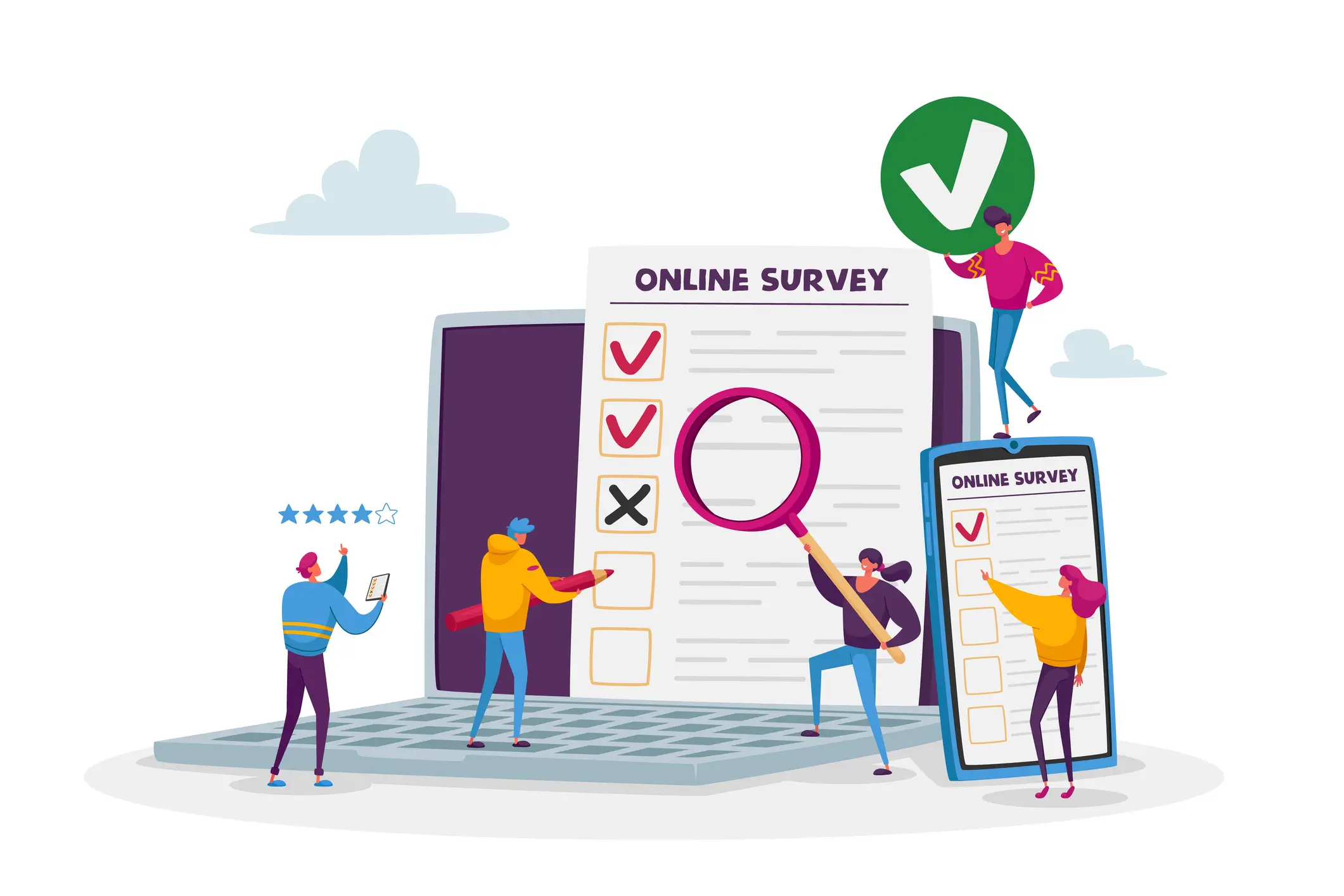Benefits of Net Promoter Score for Business Growth | SurveyVista
Customer loyalty isn’t just a nice-to-have metric anymore—it’s the foundation of sustainable business growth. Net Promoter Score (NPS) has emerged as the gold standard for measuring this loyalty, giving you a clear picture of where your customers stand and what they’re likely to do next.
Customer loyalty isn’t just a nice-to-have metric anymore—it’s the foundation of sustainable business growth. Net Promoter Score (NPS) has emerged as the gold standard for measuring this loyalty, giving you a clear picture of where your customers stand and what they’re likely to do next.
But here’s what makes NPS truly powerful: it’s not just about the number. It’s about the actionable insights that drive real business decisions and measurable results.
What Is Net Promoter Score and Why Does It Matter
Net Promoter Score boils down customer loyalty to one simple question: “How likely are you to recommend us to a friend or colleague?” Customers respond on a scale of 0-10, and you categorize them as Promoters (9-10), Passives (7-8), or Detractors (0-6).
The beauty lies in its simplicity. While other metrics get lost in complexity, NPS gives you a clear -100 to +100 score that everyone in your organization can understand and act on. Customer experience professionals love NPS because it cuts through the noise and tells you not just how satisfied customers are, but how they actually feel about your brand.
The Top 15 Benefits of Net Promoter Score
1. Delivers Measurable Return on Investment
Here’s a stat that’ll grab your CFO’s attention: 80% of your future revenue comes from just 20% of your existing customers. This is known as the Pareto Principle. NPS helps you identify and nurture these high-value relationships before your competitors do.
Companies with higher NPS scores consistently outperform their competitors in revenue growth, customer retention, and market share. SurveyVista’s native Salesforce integration makes this ROI tracking seamless—you can connect NPS scores directly to customer lifetime value and churn prevention without complex setup.
2. Provides Actionable Insights You Can Act On Immediately
NPS isn’t just a number sitting in a dashboard—it’s your roadmap for immediate action. When a customer gives you a low score, you know exactly what to do: reach out, understand their concerns, and fix the problem before they walk away.
The real magic happens when you follow the collect, integrate, understand, and act process. This immediate actionability sets NPS apart from other metrics that leave you wondering what to do next.
3. Captures the Complete Customer Journey
Unlike transaction-based surveys that only capture a moment in time, NPS measures the entire relationship. It’s the difference between asking “How was your meal?” and “How do you feel about this restaurant?”
This holistic view reveals systemic issues that single-touchpoint surveys miss. You get a 360-degree view of customer sentiment that helps you prioritize improvements across every department and touchpoint.
4. Enables Both Proactive and Reactive Customer Management
Smart customer experience teams use NPS data to prevent problems before they escalate. When you spot declining scores in specific segments, you can intervene proactively with targeted outreach or process improvements.
But NPS also excels at reactive management. Real-time feedback capabilities mean you can respond to detractors within hours, not weeks.
5. Creates Universal Understanding Across Your Organization
The -100 to +100 scale is beautifully simple. Your sales team, support staff, executives, and even your newest intern can understand what a score of 65 means and why it matters.
This universal language eliminates confusion and gets everyone aligned around customer experience goals. When everyone speaks the same customer experience language, your entire organization becomes more customer-centric by default.
6. Supports Predictable Future Growth
High NPS scores aren’t just feel-good metrics—they’re leading indicators of sustainable business growth. Promoters become your most reliable source of referrals, repeat business, and positive word-of-mouth marketing.
Companies with consistently high NPS scores experience more predictable revenue streams because they’ve built a base of loyal customers who stick around and bring others with them.
7. Offers Unmatched Simplicity in Survey Design
One question. That’s it. While other surveys overwhelm customers with lengthy questionnaires, NPS respects their time with a single, powerful question.
This simplicity drives higher response rates, giving you more reliable data to work with. For overwhelmed teams managing multiple feedback programs, NPS provides maximum insight with minimal complexity.
8. Predicts Customer Behavior and Business Outcomes
NPS scores correlate strongly with future customer behavior. Promoters are more likely to make repeat purchases, increase their spending over time, refer new customers, and forgive occasional service hiccups.
This predictive power helps you forecast everything from churn rates to revenue growth. You can model different scenarios based on NPS improvements and make data-driven decisions about where to invest your resources.
9. Builds Stronger Customer Relationships
Simply asking for feedback shows customers you value their opinion. The act of measuring NPS demonstrates that you’re committed to improving their experience.
When customers see you acting on their feedback, it strengthens their emotional connection to your brand. They feel heard, valued, and more invested in your success.
10. Enables Powerful Industry Benchmarking
NPS gives you a standardized way to compare your performance against competitors and industry leaders. You can see exactly where you stand and set realistic improvement targets.
Industry benchmarks help you understand what “good” looks like in your sector. This benchmarking capability helps you set appropriate goals and celebrate meaningful improvements.
11. Measures True Customer Loyalty
Satisfaction and loyalty are two different things. A customer might be satisfied with your service but still switch to a competitor for a better deal.
NPS measures the emotional connection that drives true loyalty—the willingness to recommend your brand to others. Understanding this distinction helps you focus on building relationships that last, not just transactions that satisfy.
12. Reduces Customer Acquisition Costs
Your promoters become your most effective marketing channel. They refer new customers at zero acquisition cost and with higher conversion rates than any paid advertising.
Word-of-mouth referrals from promoters typically have higher lifetime value, faster sales cycles, better retention rates, and lower support costs. This organic growth engine becomes more powerful as your NPS improves, creating a virtuous cycle of growth.
13. Improves Employee Engagement and Performance
Sharing positive NPS feedback with your team boosts morale and reinforces good service behaviors. Employees love hearing directly from happy customers about the impact of their work.
This positive reinforcement creates a culture where customer experience becomes everyone’s responsibility. Teams with regular exposure to customer feedback consistently deliver better experiences because they understand the real impact of their efforts.
14. Identifies Your Brand Advocates
Promoters aren’t just satisfied customers—they’re your brand advocates. These are the people who will defend your brand in online reviews, recommend you in professional networks, and stick with you through challenges.
Identifying these advocates lets you invite them to case studies, include them in beta testing programs, ask for referrals at the right moments, and build deeper partnerships. Your promoters are often your most valuable customers in ways that go beyond their direct spending.
15. Streamlines Decision-Making Across Departments
NPS data helps prioritize initiatives and allocate resources more effectively. When you know which issues impact customer loyalty most, you can focus your improvement efforts where they’ll have the biggest impact.
This data-driven approach reduces internal debates about priorities. Clear priorities based on customer feedback lead to faster execution and better results across all departments.
How to Maximize These NPS Benefits with the Right Platform
The Power of Native Salesforce Integration
Most survey tools create data silos that complicate your customer experience efforts. You collect feedback in one system, store customer data in another, and struggle to connect the dots between sentiment and behavior.
SurveyVista’s 100% Salesforce-native approach eliminates these headaches entirely. Your NPS data lives right alongside your customer records, sales history, and support tickets—no coding, no data integration nightmares.
Turning Feedback into Action Faster
Speed matters in customer experience. When a detractor submits feedback, every hour you wait to respond increases the chance they’ll churn or share their frustration publicly.
Having NPS data directly in Salesforce enables immediate follow-up through automated workflows. Your support team gets instant alerts, your account managers see sentiment changes in real-time, and your executives can track progress without switching between systems.
Ensuring Data Security and Compliance
Customer feedback often contains sensitive information that needs careful handling. Native Salesforce integration means your NPS data inherits all of Salesforce’s security features and compliance certifications.
You don’t need separate security audits, additional compliance documentation, or complex data governance policies. This built-in compliance gives you peace of mind while enabling the real-time insights that drive better customer experiences.
Getting Started with NPS for Customer-Centric Growth
The key to successful NPS implementation isn’t just collecting scores—it’s building a system that turns feedback into action. Start by identifying your most critical customer touchpoints and the teams who need to act on feedback quickly.
Choose a platform that integrates seamlessly with your existing workflows rather than creating new complexity. Remember that NPS is most powerful when it becomes part of your regular business rhythm, not a quarterly project that gets forgotten between surveys.
Ready to Transform Your Customer Experience?
NPS delivers real business value when implemented correctly, but the platform you choose makes all the difference. The right solution doesn’t just collect feedback—it integrates seamlessly with your existing processes and empowers your teams to act on insights faster.
Drive customer-centric growth by leveraging a 100% Salesforce-native feedback platform that seamlessly collects and integrates feedback across every touchpoint. Improve customer retention and operational efficiency while empowering your teams to make better decisions faster, all while maintaining full data compliance and security.
Frequently Asked Questions
What is a good Net Promoter Score?
NPS scores range from -100 to +100. Generally, any positive score is good, 50+ is excellent, and 70+ is world-class. However, benchmarks vary by industry, so compare your score against competitors in your specific sector for the most meaningful context.
How often should I survey customers for NPS?
Most companies send NPS surveys quarterly or after key touchpoints like purchases or support interactions. Avoid over-surveying the same customers—once every 90-120 days is typically optimal for relationship NPS surveys to maintain response rates.
What’s the difference between NPS and customer satisfaction surveys?
Customer satisfaction measures how happy customers are with specific interactions, while NPS measures overall loyalty and likelihood to recommend. NPS predicts future behavior and business growth, while satisfaction scores focus on past experiences.
How do I respond to NPS detractors?
Contact detractors within 24-48 hours to understand their concerns and offer solutions. Use their feedback to identify systemic issues. Quick, personalized responses can often convert detractors into promoters by showing you value their input.
Can NPS really predict business growth?
Yes, studies show strong correlations between NPS scores and revenue growth, customer retention, and referral rates. Promoters typically spend more, stay longer, and refer others, making NPS a reliable leading indicator of business performance.
More Like This

Rajesh Unadkat 
Founder and CEO
Rajesh is the visionary leader at the helm of SurveyVista. With a profound vision for the transformative potential of survey solutions, he founded the company in 2020. Rajesh's unwavering commitment to harnessing the power of data-driven insights has led to SurveyVista's rapid evolution as an industry leader.
Connect with Rajesh on LinkedIn to stay updated on the latest insights into the world of survey solutions for customer and employee experience management.



